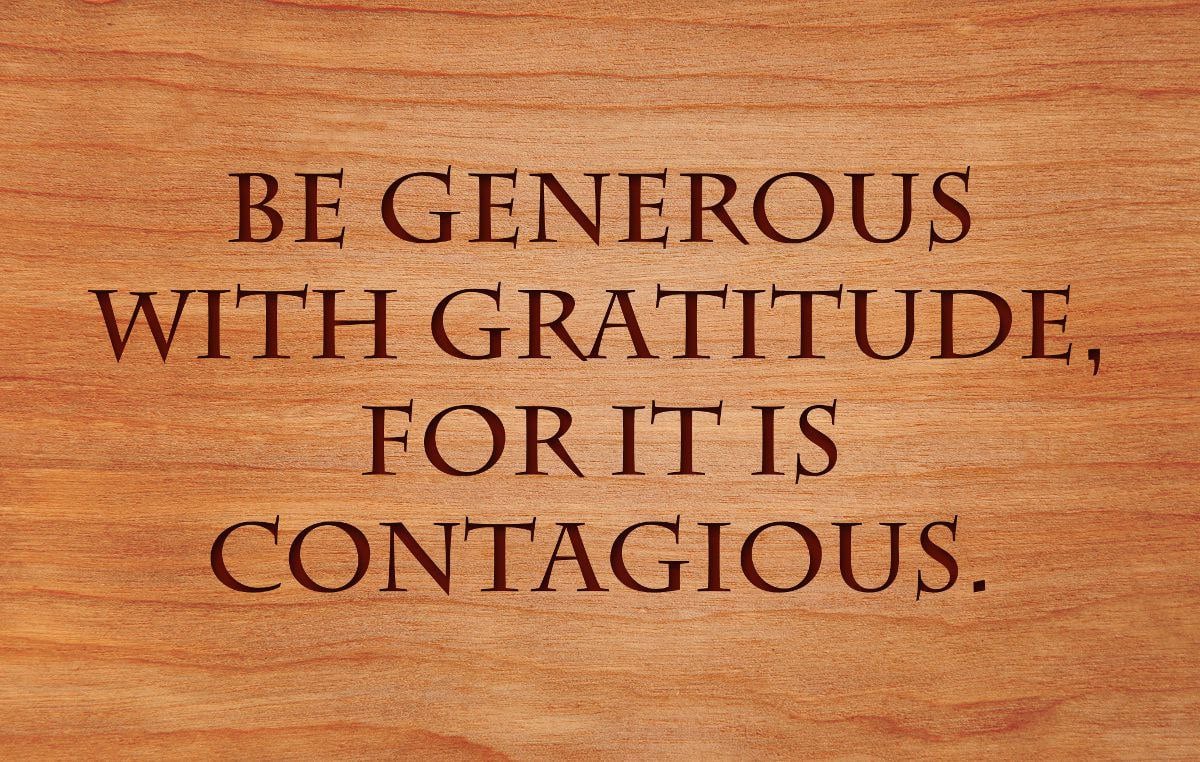
Reflections on Leadership: Generous Leadership
Updated from the original publication on June 1, 2016.
 The June 2012 issue of Reflections on Leadership focused on generosity as one of the key attributes of leaders. It is still a pretty good read for being 4 years old, and for those who may be interested, it is can be accessed on the PSL web site under About us, Information and Financials, Reflections on Leadership, 2012 archive, June. Recently I had the opportunity to read Adam Grant’s book Give and Take, A Revolutionary Approach to Success, and felt compelled to add to those earlier thoughts on generosity.
The June 2012 issue of Reflections on Leadership focused on generosity as one of the key attributes of leaders. It is still a pretty good read for being 4 years old, and for those who may be interested, it is can be accessed on the PSL web site under About us, Information and Financials, Reflections on Leadership, 2012 archive, June. Recently I had the opportunity to read Adam Grant’s book Give and Take, A Revolutionary Approach to Success, and felt compelled to add to those earlier thoughts on generosity.
Grant’s book explores the connection between success and giving attitudes in the work place. As a part of his study he divides people into three distinct groups related to generosity – Givers, Takers and Matchers. Weaving stories of each group taken from the business environment he illustrates the behavior of each.
Takers
Takers are those who see the world as a win / lose proposition. Typically they are take charge people - tough negotiators, who focus on winning at all costs. Takers ask for and accept favors, and may occasionally do something positive for someone else. But they primarily work with others only to the extent that they can gain competitive advantage in the workplace. Givers on the other hand will go out of their way to be helpful. They are generous with their time and attention, even to those who have little or no opportunity to do anything beneficial in return. Matchers are those who will give to benefit others, but they keep score, expecting everything to eventually even out. They will behave as givers to a point, but they anticipate the possibility of something in return.
The essential question that Grant poses is “Which of these three groups tend to be the most successful leaders, and what are the reasons for their success? What he found was that:
- Takers were the least successful in the long run.
- Matchers were in the middle in terms of performance
- Givers were found to be the most and least successful
Takers could be charming – especially to superiors at work. But this was in contrast to the attitude toward their peers and subordinates, described in a Dutch phrase - “kissing up and kicking down”. The takers were the least successful in the long run because all of the matchers they worked with eventually stopped going out of their way to collaborate or assist them in any way. Eventually they succeeded only in areas when they did not need help from anyone else.
Matchers
Matchers were more successful than the takers. Operating within well understood, but often unspoken limits, they worked well with those who viewed giving and receiving as a two way street or a series of exchanges. The phrase “What goes around, comes around” would describe their expectations.
Givers
While the outcome on the takers and matchers was expected, the puzzle was why the givers were both the most and least successful leaders. It turns out that the least successful were indiscriminate, unfocused givers who were so willing to do for others that they neglected the essential tasks and responsibilities of their job. The most successful were able to be more productive by becoming what Grant called “otherish”. They still gave freely, but they were more focused in their giving and recognized the importance of protecting their own well-being.
 Grant’s findings resonate with my experience as a leader. The most successful leaders are givers that are distinguished by a few key behaviors:
Grant’s findings resonate with my experience as a leader. The most successful leaders are givers that are distinguished by a few key behaviors:
- Mentoring is one of the key markers of a giving focused leader. This behavior has an immediate effect as well as a long lasting legacy. Every successful leader that I know can describe at least one mentor that provided encouragement and support without any expectation of benefit or personal gain.
- The ability to learn. Giving leaders see their time with other people as a learning experience. This genuine interest enables them to understand what other people are thinking and might need, opening their vision to connections and insights that takers and matchers often miss.
- Trust is the glue that holds people together in good times and in bad. Givers build trust and goodwill through a combination of helpfulness and genuine concern for those around them. By taking the risk to become vulnerable, unconditional givers demonstrate that they are trustworthy and set the tone for matchers who may be reluctant to take the first step.
- Collaboration is a requirement in solving complex problems, finding novel and innovative solutions, or adjusting to rapidly changing conditions. If this describes your work environment, a giving culture is the key to your future. Issues like who gets credit for success or the blame for failure requires a healthy measure of personal generosity, willingness to share, and to celebrate the success of others. Grant would argue that true collaboration cannot exist without givers on the team.
- Loyalty – Giving leaders inspire a loyalty in those around them based in genuine respect.
What can we do as leaders to foster a culture of giving in the work place?
First - Model giving behavior by being generous with your time and attention. Reach out to help those who clearly cannot reciprocate.
Second - Build teams filled with givers and matchers. This means finding ways in an interview process to identify taking, giving and matching tendencies in the selection process. Every leader has a story of hiring an extremely talented individual whose self-centeredness (a classic taker behavior) was a detriment to the team and entire organization. Look for individuals who have demonstrated the capacity for cooperation and collaboration and you will find givers and matchers.
Third - Focus your praise on effective teamwork rather than just calling attention to individual star performers. Reward giving behavior - like mentoring and providing help across normal departmental lines of authority.
Fourth - Find a place to volunteer. Civic, community, or church groups are always looking for help – on the front line and in leadership roles. Gaining experience as a board member outside your particular area of expertise can expand your horizons and help you to learn and grow in important ways.
The impact of a giving attitude is not just confined to the workplace or desirable attributes of leaders. Being a giver has deeply spiritual roots.
One man gives freely, yet gains even more. Another withholds unduly, but comes to poverty. A generous man will prosper. He who refreshes others will himself be refreshed. (Proverbs 11:24, 25 KJV) A gift opens the way for the giver and ushers him into the presence of the great. (Proverbs 18:16 KJV)
And the words of Jesus clearly express the reciprocal nature of giving and receiving in Luke 6:38 – Give and it will be given to you. A good measure, pressed down, shaken together and running over, will be poured into your lap (KJV).
Finally, I have learned that true generosity is within reach for nearly every person. Several months ago I was traveling in Africa on a mission trip, visiting a church in a very poor area in Zimbabwe. Meeting with church leaders we heard how they were responding to the needs of children orphaned by AIDS in their region. A significant number of their congregation members had taken orphans into their homes in spite of the fact that they were living on an average of about $3 a day. But that was not all. They spoke of an outreach ministry to a group of people about 30 miles away, where the conditions were worse. It was truly humbling to observe such generosity in the poorest of the poor.
Every human being has a unique combination of time, talent, and resources available. Being a giving leader may not come naturally to everyone, but it is an impulse that can be cultivated and strengthened.
Generosity is also personally good for us as individuals. Studies have shown that giving actually feels good, and volunteers are happier and live longer. So, if you want to be a better leader and live a longer and happier life, become an “otherish” giver.
About Steve Proctor
As the now-retired CEO of Presbyterian Senior Living, Mr. Proctor was employed by PSL from 1971 - 2019. He is a Registered Nurse and Licensed Nursing Home Administrator with a BS degree in business administration from Elizabethtown College. He also holds a master’s degree in gerontology from the University of North Texas. Before becoming CEO, Mr. Proctor was Chief Operating Officer for 16 years. In addition, he has served as a Board member and is a Past President of the Pennsylvania Association of Non-Profit Homes for the Aging (“PANPHA”). In November of 1995, the American Association of Homes and Services for the Aging (“AAHSA”), now known as LeadingAge, recognized Mr. Proctor’s proven leadership and accomplishments by electing him to serve as Chair of its national board of directors. He served as Chair-elect in 1996 and 1997, as Chair in 1998 and 1999, and as past-Chair in 2000 and 2001. He has also served as chair of the International Association of Homes and Services for the Aging.

